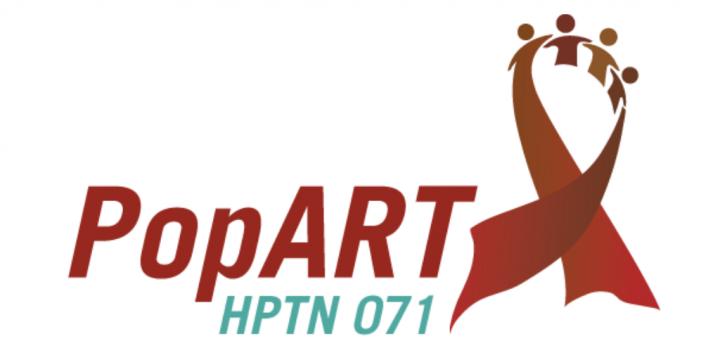
Credit: HIV Prevention Trials Network
DURHAM, NC – Researchers today presented results from the HPTN 071 (PopART) study at the annual Conference on Retroviruses and Opportunistic Infections (CROI) in Seattle. The study examined the impact of a package of HIV prevention interventions on community-level HIV incidence in urban and peri-urban communities in Zambia and South Africa. Findings from HPTN 071 (PopART) show delivery of an HIV prevention strategy that includes offering in-home HIV testing to everyone, with immediate referral to HIV care, and treatment for people living with HIV based on prevailing in-country guidelines, can substantially reduce new HIV infections.
“We saw a highly significant 30 percent decrease in new HIV infections with a prevention strategy where HIV treatment was started according to in-country guidelines,” said Richard Hayes, DSc, HPTN 071 (PopART). protocol chair and professor of epidemiology and international health at the London School of Hygiene and Tropical Medicine. “We did not see a similar reduction in new HIV infections with another strategy where universal HIV treatment was offered from the beginning of the study. Additional analyses are underway to explore the reasons for this finding.”
The HPTN 071 (PopART) study involved more than one million people living in 21 communities in Zambia and South Africa, making it the largest HIV prevention trial to date. The study measured the effects of two HIV combination prevention strategies offering HIV testing to people in their homes annually, with linkage to HIV care and treatment at the local health facility for those living with HIV.
“Overall, both strategies improved knowledge of HIV status and uptake of treatment,” said Wafaa El-Sadr MD, MPH, MPA, HPTN co-principal investigator, and professor of epidemiology and medicine at Columbia University in New York. “These findings show that a combination prevention strategy similar to PopART may be an effective tool to slow the global HIV epidemic.”
HPTN 071 (PopART) researchers are currently examining the effects of the interventions on other study outcomes including herpes simplex virus-2 incidence, tuberculosis and HIV-related stigma. Work is also in progress to estimate the cost-effectiveness of the interventions.
“While the findings from the study are very encouraging, testing and treatment coverage fall short among young people and men necessitating the need for further research on how to fill these important gaps,” said Sarah Fidler, MBBS, PhD, HPTN 071 (PopART) protocol co-chair and professor of medicine at Imperial College, London
The research team in Zambia was led by Helen Ayles, MBBS, PhD, director of research, Zambart, Lusaka, Zambia. The research team in South Africa was led by Nulda Beyers, MD, PhD, and Peter Bock, MD, PhD, MPH, research clinicians, Desmond Tutu TB Centre at Stellenbosch University, Cape Town, South Africa.
“The study team is deeply grateful to the South African and Zambian study participants, the implementing and community partners, research teams, Ministries and Departments of Health, study funders and sponsor, without whom this research would not have been possible,” said Myron Cohen, MD, HPTN co-principal investigator and director of the Institute for Global Health at the University of North Carolina in Chapel Hill.
###
The HPTN 071 (PopART) study was sponsored by the National Institute of Allergy and Infectious Diseases (NIAID) with primary funding from the U.S. President’s Emergency Plan for AIDS Relief (PEPFAR), which is administered by the Office of the U.S. Global AIDS Coordinator and Health Diplomacy in the U.S. Department of State. Additional funding was provided by the International Initiative for Impact Evaluation (3ie) with support from the Bill & Melinda Gates Foundation, as well as by NIAID, the National Institute on Drug Abuse (NIDA) and the National Institute of Mental Health (NIMH), all part of NIH.
For more information about HPTN 071, visit hptn.org, or ClinicalTrials.gov using study identifier NCT01900977
About HPTN
The HIV Prevention Trials Network (HPTN) is a worldwide collaborative clinical trials network that brings together investigators, ethicists, community members and other partners to develop and test the safety and efficacy of interventions designed to prevent the acquisition and transmission of HIV. NIAID, NIMH and NIDA co-fund the HPTN. The HPTN has collaborated with more than 85 clinical research sites in 19 countries to evaluate new HIV prevention interventions and strategies in populations that bear a disproportionate burden of infection. The HPTN research agenda – more than 50 trials ongoing or completed with over 161,000 participants enrolled and evaluated – is focused primarily on the use of integrated strategies: use of antiretroviral drugs (antiretroviral therapy and pre-exposure prophylaxis); interventions for substance abuse, particularly injection drug use; behavioral risk reduction interventions and structural interventions. For more information, visit hptn.org.
Media Contact
Eric Miller
[email protected]




